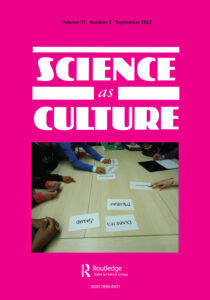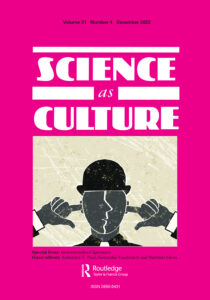https://www.tandfonline.com/journals/csac
SaC mission statement: Our culture is a scientific one, defining what is natural and what is rational. Its values can be seen in what are sought out as facts and made as artefacts, what are designed as processes and products, and what are forged as weapons and filmed as wonders. In our daily experience, power is exercised through expertise, e.g. in science, technology and medicine. Science as Culture explores how all these shape the values which contend for influence over the wider society.
SaC has three Calls for Papers, each one with a literature review. Contributors should engage with the STS concepts there. So you will need to obtain the full CfP, as below.
SaC special issue: “Interdisciplinary Research on Societal Challenges”
Guest editors: Antti Silvast, Jaakko Taipale, Mikko J. Virtanen and Terhi Esko
Full CfP: https://think.taylorandfrancis.com/special_issues/science-culture-interdisciplinary-research
This SaC special issue invites contributions that analyse how interdisciplinary research collaboration relates to societal challenges. We welcome contributions that deal with the following questions:
- How does interdisciplinary research frame the societal challenges that it addresses?
- What choices and judgments are involved in such framing?
- What consequences does the policy-based interwovenness of interdisciplinarity and societal challenges have for research collaboration and relationships with stakeholder groups and their perspectives? For example, are new strategic partnerships created? What are the related trade-offs?
- Given the policy interest in interdisciplinary research around societal challenges, how does this affect the knowledge that is produced by academics who gain the respective funding?
- How does such research address (or not) the original policy drivers?
Submission Details
Deadlines
Abstracts: 1 February 2023
Full papers: 1 June 2023
All SaC research papers must follow the SaC editorial guidelines, especially the structural-conceptual features on the first page, https://www.tandf.co.uk/journals/authors/csac_edit_guidelines.pdf
Queries to the guest editors:
Antti Silvast, aedsi@dtu.dk and Jaakko Taipale, jaakko.taipale@helsinki.fi
SaC Forum: “Futures of STS Academic Publishing”
Guest editors: Wolfgang Kaltenbrunner, Maria Amuchastegui and Kean Birch
Full CfP: https://think.taylorandfrancis.com/special_issues/science-culture-academic-publishing/
This SaC Forum invites contributions that critically reflect on current STS publishing, review and editorial practices, especially how they might develop in the future. As guiding themes, we propose the following questions:
- How are STS publishing, review and editorial practices affected by competition for jobs, funding, and publishing space, and what does this mean for the kind of knowledge produced?
- How does the changing political economy of publishing affect STS publishing practices, for example as regards the ownership structures of the publishing industry and the role of journal metrics?
- How do experiences of STS publishing practices vary across different levels of the academic hierarchy and different parts of the world?
- What alternative forms of STS publishing, reviewing and editing exist or can be imagined, for example, collective forms of editorship or collective writing?
- What can be done to ensure that STS publishing welcomes diverse intellectual traditions and concepts, as well as diverse forms of writing and publishing?
Submission Details
Deadline: 1 May 2023.
Length: Forum articles are flexible, ranging between 2k-6k words.
Queries and articles to the guest editors: Wolfgang Kaltenbrunner (wkaltenbrunner@gmail.com) or Maria Amuchastegui (mamuchas@yorku.ca).
SaC Forum: “Participatory Knowledge Co-production”
Guest editors: Jennifer Carrera and Les Levidow
Full CfP: https://bit.ly/Participatory_Knowledge
Academic researchers have a long experience in co-producing knowledge with practitioners. This has often aimed to contest the dominant expertise, to shift power imbalances and thus to empower groups of many kinds. These encompass subaltern groups contesting various inequities (of race, class, gender, etc.). In such ways, participatory knowledge co-production has sought to promote societal transformation.
Our Forum invites articles that address some of the following questions:
- How have researchers co-produced knowledge with practitioners to inform their collective action to shift power? for resisting oppressive arrangements and/or building liberatory alternatives?
- How has this process facilitated or strengthened practitioners? as a collective subject of strategic action?
- What internal tensions have arisen between researchers and practitioners? e.g. in scientizing dissent? Or in highlighting the implicit politics of knowledge?
- What have been the strategies to shift epistemic authority and institutional power?
- How have such efforts promoted social learning from outcomes, towards more effective strategies?
Those questions arise from concepts in the literature survey; articles should engage with them. Contributors are welcome to write personally about their own experiences.
Submission Details
Deadline: 1 May 2023.
Length: Forum articles are flexible, ranging between 2k-6k words.
Guest editors: Queries or submissions to Jennifer Carrera jcarrera@msu.edu and Les Levidow, les.levidow@open.ac.uk

